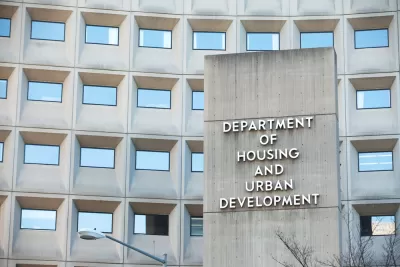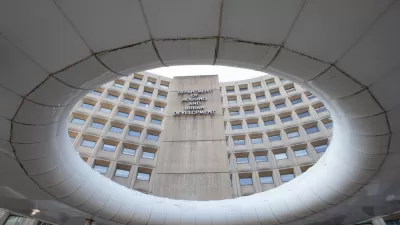A revised U.S. Department of Housing and Urban Development rule makes it more difficult to submit claims of housing discrimination when a landlord's decisions is influenced by a third-party tenant screening service.

The Department of Housing and Urban Development (HUD) changed rules regulating housing discrimination complaints to immunize landlords from discrimination charges, "if they use 'profit' as a reason for their decision-making, or if they use third-party systems to choose tenants," reports Lauren Kirchner. Among landlords, 90% use similar screening services to assess prospective tenants, according to The Markup and a New York Times investigative report.
The Trump administration's new HUD rule effectively dropping discrimination charges related to decision-making influenced by third-party screening services stirred dissent in fair housing proponents. "Even mortgage lenders and realtors eventually distanced themselves from HUD’s proposal—some of them invoking this summer’s seeds of a national reckoning over systematic racism in America," Kirchner says.
While HUD is loosening the rules for the use of algorithm-based screening systems, a groundbreaking Connecticut federal district court trial will decide whether CoreLogic, an algorithmic tenant screening services behind “CrimSAFE," is guilty of housing discrimination in violation of the federal Fair Housing Act. The case is likely the first lawsuit to target a screening company, rather than a landlord, for housing discrimination.
The algorithms behind CrimSAFE, "screens out Black and Latino applicants by relying on criminal records, and that it doesn’t give applicants the chance to explain their mitigating circumstances through more detailed, individualized assessments," explains Kirchner.
FULL STORY: Can Algorithms Violate Fair Housing Laws?

Planetizen Federal Action Tracker
A weekly monitor of how Trump’s orders and actions are impacting planners and planning in America.

Congressman Proposes Bill to Rename DC Metro “Trump Train”
The Make Autorail Great Again Act would withhold federal funding to the system until the Washington Metropolitan Area Transit Authority (WMATA), rebrands as the Washington Metropolitan Authority for Greater Access (WMAGA).

The Simple Legislative Tool Transforming Vacant Downtowns
In California, Michigan and Georgia, an easy win is bringing dollars — and delight — back to city centers.

The States Losing Rural Delivery Rooms at an Alarming Pace
In some states, as few as 9% of rural hospitals still deliver babies. As a result, rising pre-term births, no adequate pre-term care and harrowing close calls are a growing reality.

The Small South Asian Republic Going all in on EVs
Thanks to one simple policy change less than five years ago, 65% of new cars in this Himalayan country are now electric.

DC Backpedals on Bike Lane Protection, Swaps Barriers for Paint
Citing aesthetic concerns, the city is removing the concrete barriers and flexposts that once separated Arizona Avenue cyclists from motor vehicles.
Urban Design for Planners 1: Software Tools
This six-course series explores essential urban design concepts using open source software and equips planners with the tools they need to participate fully in the urban design process.
Planning for Universal Design
Learn the tools for implementing Universal Design in planning regulations.
Smith Gee Studio
City of Charlotte
City of Camden Redevelopment Agency
City of Astoria
Transportation Research & Education Center (TREC) at Portland State University
US High Speed Rail Association
City of Camden Redevelopment Agency
Municipality of Princeton (NJ)





























